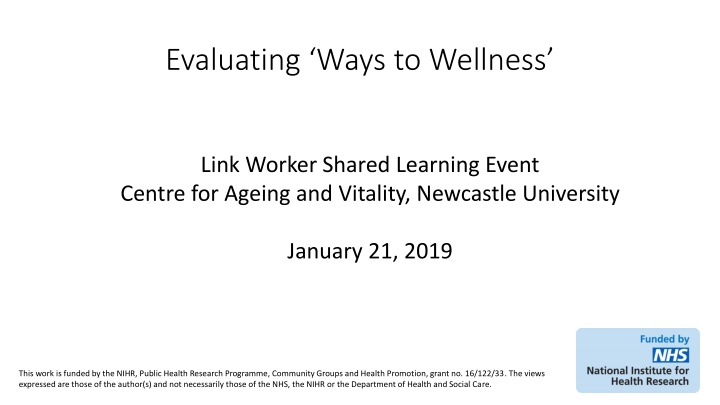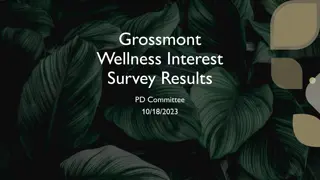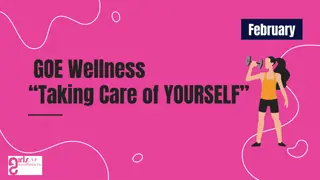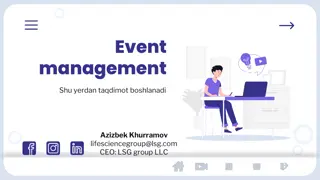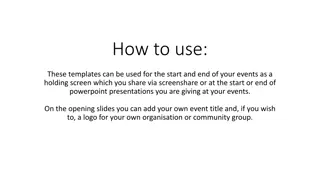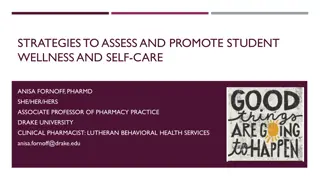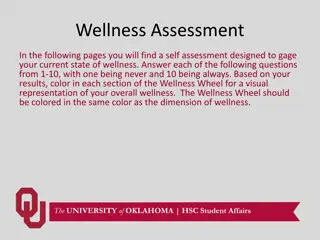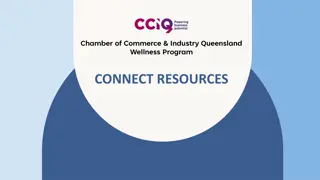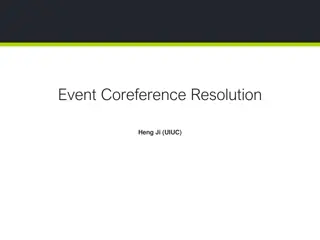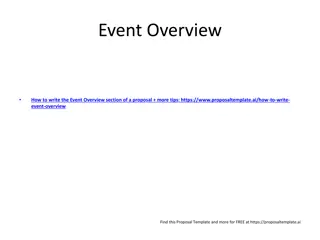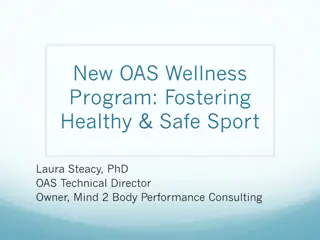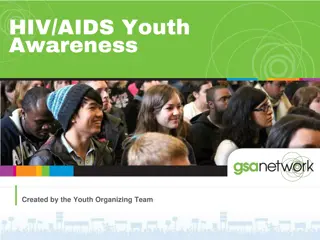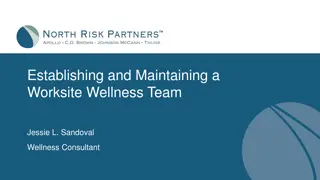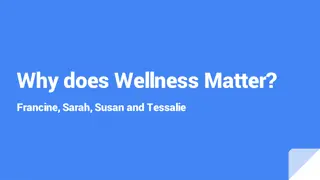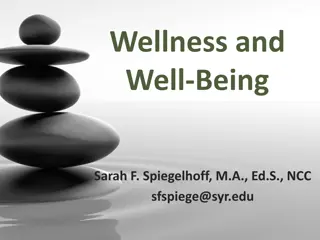Evaluating Ways to Wellness Shared Learning Event
This work funded by NIHR aims to evaluate the impact of a community-based social prescribing intervention on individuals with type 2 diabetes in a diverse area of high socio-economic deprivation. The project seeks to assess the intervention's effects on health, healthcare utilization, and costs through ethnographic observation in adults aged 40-74.
Download Presentation

Please find below an Image/Link to download the presentation.
The content on the website is provided AS IS for your information and personal use only. It may not be sold, licensed, or shared on other websites without obtaining consent from the author.If you encounter any issues during the download, it is possible that the publisher has removed the file from their server.
You are allowed to download the files provided on this website for personal or commercial use, subject to the condition that they are used lawfully. All files are the property of their respective owners.
The content on the website is provided AS IS for your information and personal use only. It may not be sold, licensed, or shared on other websites without obtaining consent from the author.
E N D
Presentation Transcript
Evaluating Ways to Wellness Link Worker Shared Learning Event Centre for Ageing and Vitality, Newcastle University January 21, 2019 This work is funded by the NIHR, Public Health Research Programme, Community Groups and Health Promotion, grant no. 16/122/33. The views expressed are those of the author(s) and not necessarily those of the NHS, the NIHR or the Department of Health and Social Care.
Attempting to get research funded . Unsuccessful Successful Unsuccessful Unsuccessful Successful 2015 National Institute for Health Research 2015/16 Cabinet Office 2016 School for Public Health Research 2016 School for Primary Care Research 2017 School for Public Health Research (shortfall funding) 2017 Newcastle University Institute for Ageing 2017 National Institute for Health Research, Public Health Research Programme: 16/122 Community groups and health promotion Successful Successful
I am on the road [to better health] but it is slow if it was easy I would have done it years ago I have been well impressed [with Ways to Wellness] because they have a very practical approach and know it has got to be incremental you can t do everything at once you can t do everything at once so you have got to start small and build up they have got the big picture in mind. (woman aged 55-59 years) Whatever money I owed like electricity and TV licence was in my mind always eating me from inside. [Link worker] sorted that out and it just changed so many things . It changed my attitude, it changed my behaviour and it changed my mood . I am not depressed like before I feel better about everything I go out almost every day I write, I do jobs at home yes, a big change. (woman 45-49 years)
Public Health Research Programme: 16/122 Community groups and health promotion Project title Impact of a community based social prescribing intervention on people with type 2 diabetes in an ethnically diverse area of high socio-economic deprivation. Exploiting a natural experiment to evaluate effects on health and health care utilisation with economic assessment and ethnographic observation. Aims to evaluate the impact and costs of a community-based link worker social prescribing intervention on the health and health care utilisation of adults aged 40-74 with type 2 diabetes, living in a multi-ethnic area of high socio-economic deprivation.
Research Team John Wildman TessaPollard Suzanne Moffatt Chris Drinkwater Mark Pearce Jo Wildman
Research Team Kate Gibson Jayne Jefferies Bethan Griffiths Nicki O Brien Linda Penn Allison Lawson
Statistical data routinely collected Quality and Outcomes Framework (QOF) data The QOF is a GP performance management and payment system. It rewards GP practices in England for the quality of care they provide to their patients. E.g. QOF indicator: % of patients with diabetes and history of CVD who are prescribed a statin Data on type 2 diabetes management, smoking, weight, blood pressure etc.
Statistical data routinely collected Secondary Uses Service (SUS) data Used for healthcare planning, hospital payments and commissioning etc. Information collected whenever a patient or service user is treated or cared for E.g. hospital visit, admission (routine or emergency), length of stay etc.
Treatment and control groups Group 1 Treatment: Eligible patients in WtW referring GP practices who have been with WtW for a year or more Control: patients who have just started with WtW Group 2 Treatment:Patients in WtW Control: eligible patients in WtW referring practices who are NOT in the WtW service. Group 3 Treatment: Patients in WtW Control:Eligible patients NOT in WtW referring practices Group 4 Treatment: All eligible patients in WtW referring practices (regardless of whether they take part) Control:Eligible patients NOT in WtW referring practices
EQ-5D-5L Measures health-related quality of life Nearly 30 years old Used for outcome measurement and economic evaluation Two parts: Descriptive system: health states 11111 best to 55555 worst health state Visual analogue scale (best and worse states you can imagine)
The Ethnography Why an ethnography? What it involves? Fieldwork so far
its (WtW) the best thing that ever happened to me they (the link worker) were listening and they were making an effort to find something for me when I was unable to do it for myself The community needs this (WtW). Not wants it, needs it.
Primary care staff Referral from primary care Link Workers WtW Volunteers and community sector staff VTSOs
primary carePrimary care staff Referral from Observing consultations to see referral process in action WtW Interviewing patients who both accept and decline referral Interviewing staff about their experiences of social prescribing VTSOs
After the patient had left Dr X explained that she was not eligible for WtW but her husband had been referred. It s often the way, he added one member of the family may be eligible and so they get in but they sort everyone out. After saying he couldn t afford to retire with just state pension PN L asked what about other benefits? Shall I get someone to come to talk to you? [meaning WtW]. Nah, I ll just leave it as I am he said. PN said she asked people if they needed help, if they were socially isolated or needed help with forms. Dr A joked that if you say do you want to lose weight or exercise? the answer will always be no but if you say we have this fantastic service; we can change your [tablets] but these people can talk to you about all the other things that are important to you. Dr K agreed enthusiasm was important but that you needed feedback to know it was working
Overview of WtW evaluation July 2018-spring 2021 https://research.ncl.ac.uk/nuspe/
Thank you for listening any questions? Suzanne Moffatt Suzanne.moffatt@ncl.ac.uk Jo Wildman Josephine.Wildman@ncl.ac.uk Kate Gibson kate.gibson2@ncl.ac.uk Tessa Pollard t.m.pollard@durham.ac.uk Bethan Griffith b.s.griffith2@ncl.ac.uk Allison Lawson Allison.Lawson@ncl.ac.uk
